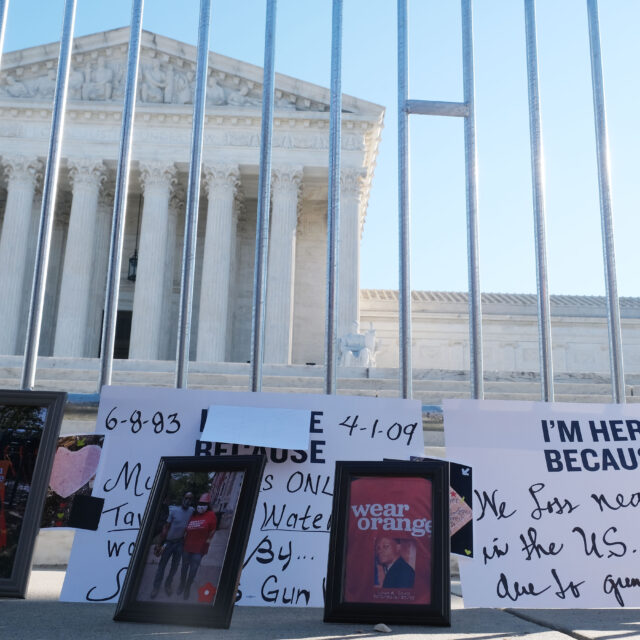Red Flag Laws: Extreme Risk Protection Orders Are Essential and Constitutional

4.9.2019
ARTICLE UPDATED on 10/14/2019 to reflect ground-breaking new Florida appeals court decision and increase in number of states with red flag laws.
Extreme Risk laws, often called red flag laws, enable family members and law enforcement to ask a court to temporarily remove firearm access when there is evidence someone poses an immediate threat to themselves or others.
These laws, when properly implemented and enforced, can be especially effective in preventing suicide. They can also help prevent mass shootings. Since last year’s tragedy in Parkland, Florida — after which it emerged that law enforcement had been alerted to concerns about the shooter but lacked a way to remove his guns — 12 states and the District of Columbia have adopted these crucial, life-saving laws, joining five states that already had adopted them in prior years.
However, in recent weeks, a number of sheriffs have vowed not to enforce Extreme Risk laws, alleging, among other specious legal claims, that the laws violate the due process of law required by the United States Constitution. This is an irresponsible and dangerous position — and it’s one clearly at odds with established law. Red flag laws already have faced constitutional challenges and courts have found that they do not violate the Second Amendment and analogous state constitutional provisions. Significantly, case law demonstrates that red flag laws have and will continue to withstand due process challenges.
Removing firearms quickly during crisis can be the difference between life and death. To that end, Extreme Risk laws generally permit courts to enter an emergency order immediately after a family member or law enforcement officer provides sufficient evidence that an individual poses an immediate risk of harming themselves or others. Because these emergency orders are based only on evidence provided by the petitioners, they are known as ex parte orders. Critically though, these laws require courts to hold a full hearing, in which both sides participate, within at most 21 days, and in most states, 14 days or less, , after the initial ex parte order is entered. Moreover, even orders entered after a full hearing have limited duration. Depending on the state statute, they are generally effective for six months to one year, and the orders cannot be extended unless the issuing court holds another hearing.
The United States Supreme Court has recognized, in multiple contexts, that this process — a pre-hearing deprivation followed by a full hearing within a reasonable time frame — satisfies the due process of law required by our Constitution. In a seminal procedural due process case, the Supreme Court held that a hearing is not required in all cases prior to the deprivation of property, as long as there is a right to a meaningful hearing thereafter.
In a variety of other cases, the Supreme Court has made clear that pre-hearing deprivations are constitutional, especially in emergency situations, often referred to by the courts as exigent circumstances. In one, the Supreme Court recognized “that where a State must act quickly, or where it would be impractical to provide pre-deprivation process, post-deprivation process satisfies the requirements of the Due Process Clause.” Through several rulings (see here and here for two examples), it has established that constitutional due process is satisfied as long as the government interest is strong; a state officer, such as a judge, is required to make a factual determination that the order is necessary; and a post-deprivation hearing is available within a short period of time after the ex parte order is entered. Extreme Risk laws meet each of these criteria for a constitutional process. Indeed, it is difficult to imagine a situation more suited to an ex parte order than one in which an armed individual experiencing some kind of crisis appears to be suicidal or a threat to others.
Following the framework established by the Supreme Court, multiple courts have issued rulings that strongly suggest they would uphold Extreme Risk Protection Orders if challenged in court on due process grounds. At the time this article first went to press in April 2019, no court had explicitly ruled on whether red flag laws were compatible with constitutional due process. But Florida’s 1st District Court of Appeal changed that on September 25, 2019 when it broke new ground and rightly upheld Florida’s red flag law in the face of a constitutional due process challenge.
In its decision, the Florida appeals court stated that “the prevalence of public shootings, and the need to thwart the mayhem and carnage contemplated by would-be perpetrators does represent an urgent and compelling state interest.” The court outlined its reasoning for upholding Florida’s red flag statute stating that it has a preventative — not punitive — purpose as well as strong due process protections. Those protections include the requirement of “a hearing within fourteen days of [a Risk Protection Order] petition being filed, thus affording a respondent due process and a prompt opportunity to resist a final order” and the “added due process safeguard [of] requiring [the party seeking the protection order] to meet the heightened ‘clear and convincing’ burden of proof standard.”
Before the recent Florida ruling, a number of federal and state courts previously issued decisions suggesting they would uphold red flags laws if challenged on due process grounds. For example, the United States Court of Appeals for the Seventh Circuit held that entry of an ex parte order taking away a father’s custody of his children did not violate due process of law where there was immediate danger to the children and a post-deprivation hearing was held quickly. Similarly, the U.S. Court of Appeals for the Sixth Circuit upheld an ex parte order of protection that required firearm surrender. The Court affirmed the district court’s finding that the importance of protecting victims of domestic violence from further violence and possibly death outweighed the defendant’s interest in possessing his firearms during the brief period between the entry of the ex parte order and the final hearing.
Another federal appeals court, meanwhile, has upheld ex parte orders revoking an individual’s firearm license, recognizing that swift government action necessary to protect public safety does not violate due process where a post-deprivation hearing is available. Several other decisions — see here, here and here for examples — reflect similar principles and have upheld ex parte orders where the risk of harm is imminent and where a final hearing was scheduled reasonably quickly, ranging from three to fourteen days.
Together, these rulings and others reflect that life-saving Extreme Risk laws fall comfortably within the acceptable bounds of due process that our Constitution requires. They also confirm that lawmakers backing these measures are on strong legal footing in rejecting constitutional claims of opponents, including threats of legal challenges.
As more and more state lawmakers see the wisdom of Extreme Risk policies, in red and blue states alike, opponents of gun safety laws likely will continue to cloak their resistance in constitutional due process concerns. But the recent Florida appeals court decision along with a strong body of additional judicial precedent demonstrate that red flag laws are clearly constitutional and resistance to them is without legal merit.





